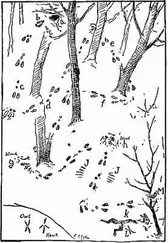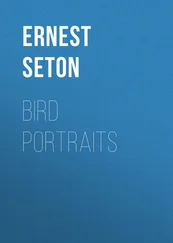Ernest Seton - Rolf in the Woods
Здесь есть возможность читать онлайн «Ernest Seton - Rolf in the Woods» весь текст электронной книги совершенно бесплатно (целиком полную версию без сокращений). В некоторых случаях можно слушать аудио, скачать через торрент в формате fb2 и присутствует краткое содержание. Год выпуска: 1997, Жанр: Приключения про индейцев, Исторические приключения, на английском языке. Описание произведения, (предисловие) а так же отзывы посетителей доступны на портале библиотеки ЛибКат.
- Название:Rolf in the Woods
- Автор:
- Жанр:
- Год:1997
- ISBN:нет данных
- Рейтинг книги:3 / 5. Голосов: 1
-
Избранное:Добавить в избранное
- Отзывы:
-
Ваша оценка:
- 60
- 1
- 2
- 3
- 4
- 5
Rolf in the Woods: краткое содержание, описание и аннотация
Предлагаем к чтению аннотацию, описание, краткое содержание или предисловие (зависит от того, что написал сам автор книги «Rolf in the Woods»). Если вы не нашли необходимую информацию о книге — напишите в комментариях, мы постараемся отыскать её.
Rolf in the Woods — читать онлайн бесплатно полную книгу (весь текст) целиком
Ниже представлен текст книги, разбитый по страницам. Система сохранения места последней прочитанной страницы, позволяет с удобством читать онлайн бесплатно книгу «Rolf in the Woods», без необходимости каждый раз заново искать на чём Вы остановились. Поставьте закладку, и сможете в любой момент перейти на страницу, на которой закончили чтение.
Интервал:
Закладка:
Over the hills of Vanderwhacker, under the woods of Boreas. Tramp, tramp, splash, tramp, wringing and sopping, but strong and hot, tramp, tramp, tramp, tramp. The partridge whirred from his path, the gray deer snorted, and the panther sneaked aside. Tramp, tramp, trot, trot, and the Washburn Ridge was blue against the sunrise. Trot, trot, over the low, level, mile-long slope he went, and when the Day-god burnt the upper hill-rim he was by brown Tahawus flood and had covered eighteen miles.
By the stream he stopped to drink. A partridge cock, in the pride of spring, strutted arrogantly on a log. Rolf drew his pistol, fired, then hung the headless body while he made a camper's blaze: an oatcake, the partridge, and river water were his meal. His impulse was to go on at once. His reason, said "go slow." So he waited for fifteen minutes. Then again, beginning with a slow walk, he ere long added to his pace. In half an hour he was striding and in an hour the steady "trot, trot," that slackened only for the hills or swamps. In an hour more he was on the Washburn Ridge, and far away in the east saw Schroon Lake that empties in the river Schroon; and as he strode along, exulting in his strength, he sang in his heart for joy. Again a gray wolf cantered on his trail, and the runner laughed, without a thought of fear. He seemed to know the creature better now; knew it as a brother, for it gave no hostile sound, but only seemed to trot, trot, for the small joy of running with a runner, as a swallow or an antelope will skim along by a speeding train. For an hour or more it matched his pace, then left as though its pleasant stroll was done, and Rolf kept on and on and on.
The spring sun soared on high, the day grew warm at noon. Schroon River just above the lake was in his path, and here he stopped to rest. Here, with the last of his oatcake and a little tea, he made his final meal; thirty eight miles had he covered since he rose; his clothes were torn, his moccasins worn, but his legs were strong, his purpose sure; only twenty-two miles now, and his duty would be done; his honours won. What should he do, push on at once? No, he meant to rest an hour. He made a good fire by a little pool, and using a great mass of caribou moss as a sponge, he had a thorough rub-down. He got out his ever-ready needle and put his moccasins in good shape; he dried his clothes and lay on his back till the hour was nearly gone. Then he girded himself for this the final run. He was weary, indeed, but he was far from spent, and the iron will that had yearly grown in force was there with its unconquerable support.
Slowly at start, soon striding, and at last in the famous jog trot of the scout he went. The sky was blackened with clouds at length, and the jealous, howling east wind rolled up in rain; the spindrift blurred the way; the heavy showers of spring came down and drenched him; but his pack was safe and he trotted on and on. Then long, deep swamps of alder barred his path, and, guided only by the compass, Rolf pushed in and through and ever east. Barely a mile an hour in the thickest part he made, but lagged not; drenched and footsore, warm and torn, but doggedly, steadily on. At three he had made a scant seven miles; then the level, open wood of Thunderbolt was reached and his stride became a run; trot, trot, trot, at six-mile gait, for but fifteen miles remained. Sustained, inspired, the bringer of good news, he halted not and faltered not, but on and on.
Tramp tramp, tramp tramp—endless, tireless, hour by hour. At five he was on Thunder Creek, scarce eight miles more to the goal; his limbs were sore, his feet were sore; bone tired was he, but his heart was filled with joy.
"News of battle, news of victory" he was bringing, and the thought lent strength; the five mires passed, the way was plain with good roads now, but the runner was so weary. He was striding, his running was done, the sun was low in the west, his feet were bleeding, the courier was brain worn and leg worn, but he strode and strode. He passed by homes but heeded them not.
"Come in and rest," called one who saw nothing but a weary traveller. Rolf shook his head, but gave no word and strode along. A mile—a short mile now; he must hold out; if he sat down he feared he could not rise. He came at last in sight of the fort; then, gathering all his force, he broke into a trot, weak, so weak that had he fallen, he could scarcely have got up, and slow, but faster than a walk: and so, as the red sun sank, he passed the gate. He had no right to give tidings to any but the general, yet they read it in his eyes. The guard broke into a cheer, and trotting still, though reeling, Rolf had kept his word, had made his run, had brought the news, and had safely reached his goal.
Chapter 74.
Van Trumper's Again
Why should the scout bringing good news be differently received from the one that brings the ill? He did not make, the news, he simply did his duty; the same in both cases. He is merely the telegraph instrument. Yet it is so ever. King Pharaoh slew the bearer of ill-tidings; that was human nature. And General Hampton brought in the tall stripling to his table, to honour him, to get the fullest details, to glory in every item as though it all were due to himself. Rolf's wonderful journey was dilated on, and in the reports to Albany he was honourably mentioned for exceptionally meritorious service as a bearer of despatches.
For three days Flying Kittering was hero of the post; then other runners came with other news and life went on.
Hitherto the scouts had worn no uniform, but the execution of one of their number, who was captured by the British and treated as a spy, resulted in orders that all be formally enlisted and put in uniform.
Not a few withdrew from the service; some, like Quonab, reluctantly consented, but Rolf was developing the fighting spirit, and was proud to wear the colours.
The drill was tedious enough, but it was of short duration for him. Despatches were to go to Albany. The general, partly to honour Rolf, selected him.
"Are you ready for another run, Kittering?"
"Yes, sir."
"Then prepare to start as soon as possible for Fort George and Albany. Do you want a mate?"
"I should like a paddler as far as Fort George."
"Well, pick your man."
"Quonab."
And when they set out, for the first time Rolf was in the stern, the post of guidance and command. So once more the two were travelling again with Skookum in the bow. It was afternoon when they started and the four-mile passage of the creek was slow, but down the long, glorious vista of the noble George they went at full canoe-flight, five miles an hour, and twenty-five miles of the great fair-way were reeled and past when they lighted their nightly fire.
At dawn-cry of the hawk they sped away, and in spite of a rising wind they made six miles in two hours.
As they approached the familiar landing of Van Trumper's farm, Skookum began to show a most zestful interest that recalled the blackened pages of his past. "Quonab, better use that," and Rolf handed a line with which Skookum was secured and thus led to make a new record, for this was the first time in his life that he landed at Van Trumper's without sacrificing a chicken in honour of the joyful occasion.
They entered the house as the family were sitting down to breakfast.
"Mein Hemel! mein Hemel! It is Rolf and Quonab; and vere is dot tam dog? Marta, vere is de chickens? Vy, Rolf, you bin now a giant, yah. Mein Gott, it is I am glad! I did tink der cannibals you had eat; is it dem Canadian or cannibal? I tink it all one the same, yah!"
Marta was actually crying, the little ones were climbing over Rolf's knee, and Annette, tall and sixteen now, stood shyly by, awaiting a chance to shake hands. Home is the abiding place of those we love; it may be a castle or a cave, a shanty or a chateau, a moving van, a tepee, or a canal boat, a fortress or the shady side of a bush, but it is home, if there indeed we meet the faces that are ever in the heart, and find the hands whose touch conveys the friendly glow. Was there any other spot on earth where he could sit by the fire and feel that "hereabout are mine own, the people I love?" Rolf knew it now—Van Trumper's was his home.
Читать дальшеИнтервал:
Закладка:
Похожие книги на «Rolf in the Woods»
Представляем Вашему вниманию похожие книги на «Rolf in the Woods» списком для выбора. Мы отобрали схожую по названию и смыслу литературу в надежде предоставить читателям больше вариантов отыскать новые, интересные, ещё непрочитанные произведения.
Обсуждение, отзывы о книге «Rolf in the Woods» и просто собственные мнения читателей. Оставьте ваши комментарии, напишите, что Вы думаете о произведении, его смысле или главных героях. Укажите что конкретно понравилось, а что нет, и почему Вы так считаете.




